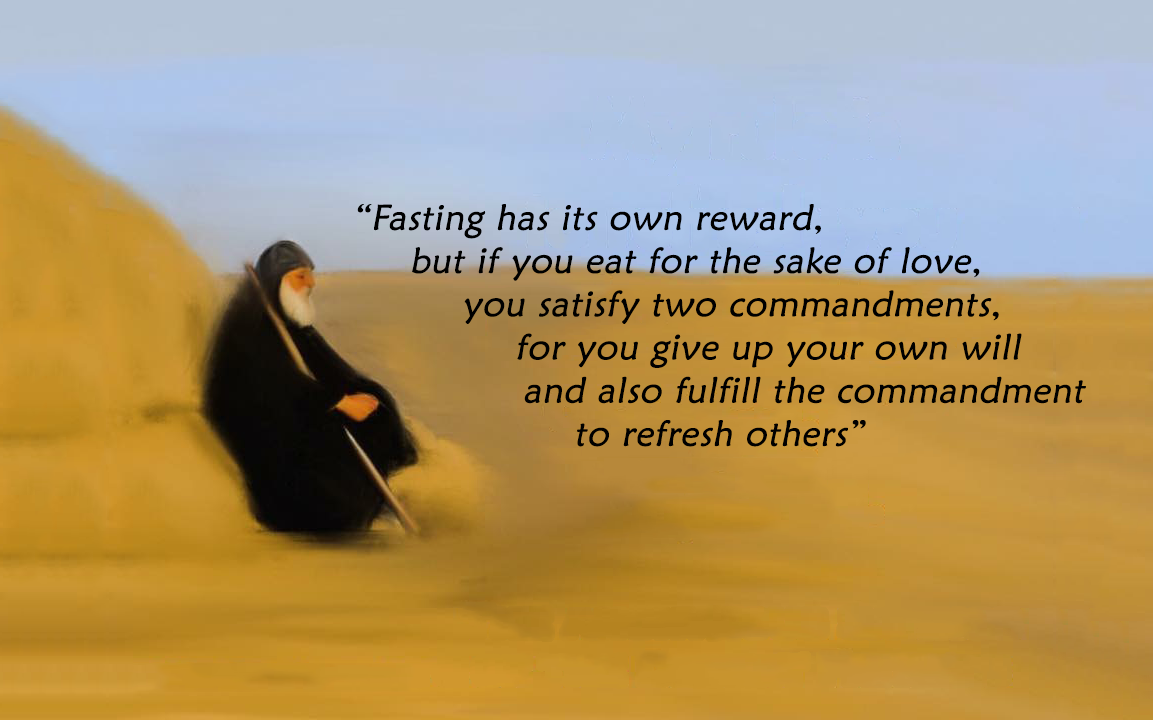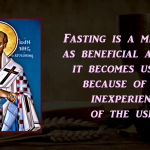A leader of a community asked Abba Poemen: “How can I gain the fear of God?” Abba Poemen replied: “How indeed can we gain the fear of God when we have bellies full of cheese and jars of salted fish?” Abba Poemen thus teaches us that the ultimate goal of fasting is to help lead …
- A leader of a community asked Abba Poemen: “How can I gain the fear of God?” Abba Poemen replied: “How indeed can we gain the fear of God when we have bellies full of cheese and jars of salted fish?” Abba Poemen thus teaches us that the ultimate goal of fasting is to help lead us, or to open us, to the fear of God.
- Another old man came to see one of the Fathers, who cooked a few lentils and said to him: “Let us say a few prayers,” and the first completed the whole Psalter, and the brother recited the two great prophets by heart. When morning came, the visitor went away, and they forgot the food. Fasting here witnesses that the true nourishment of Christians is prayer and meditation on the word of God, not the eating of food.
- A brother was hungry early in the morning, and he fought his desire so as not to eat before the third hour. When the third hour came, he forced himself to wait until the sixth hour. At that time he broke his loaves and sat down to eat, then stood up again, saying to himself: “Now wait until the ninth hour.” At the ninth hour he said the prayer and saw the power of the devil like smoke rising from his manual work, and his hunger vanished.
- It was said of an old man that one day he wanted a small fig. Taking one, he held it up in front of his eyes, and not being overcome by his desire, he repented, reproaching himself for even having had this wish. Fasting in both of these cases is the spiritual effort, which establishes the spirit over the flesh.
- Abba Joseph asked Abba Poemen: “How should we fast?” And Abba Poemen said: “I myself think it’s good to eat every day a little at a time so as not to get full.” Abba Joseph said: “Well, when you were young, didn’t you used to fast for two days at a time?” And the old man said: “Believe me, indeed I did, for three days, and even a week. But the great elders tried all of this, and found that it is good to eat every day a little less each time. In this way, they showed us the royal highway, for it is light and easy.”
- Once two brothers went to visit an old man. It was not the old man’s habit, however, to eat every day. When he saw the brothers, he welcomed them with joy, and said: “Fasting has its own reward, but if you eat for the sake of love, you satisfy two commandments, for you give up your own will and also fulfill the commandment to refresh others.”
- A brother said to an old man: “There are two brothers. One of them stays in his cell quietly, fasting for six days at a time, and imposing on himself a good deal of discipline, and the other serves the sick. Which one of them is more acceptable to God?” The old man replied: “Even if the brother who fasts six days were to hang himself up by the nose, he could not equal the one who serves the sick.” Here we learn that love is above fasting, that we must not presume to put our fasting above “the more excellent way,” the “new commandment” to love one another.
- There was a man who was leading an ascetic life and not eating bread. He went to visit an old man. It happened that pilgrims also dropped by, and the old man fixed a modest meal for them. When they sat together to eat, the brother who was fasting picked up a single soaked pea and chewed it. When they arose from the table, the old man took the brother aside and said: “Brother, when you go to visit somewhere, do not display your way of life, but if you want to keep to it, stay in your cell and never come out.” He accepted what the old man said, and after that behaved like the others whenever he met with them. We are reminded here that fasting must be done in secret, not before others, as the Lord has said: “But you, when you fast, anoint your head, and wash your face; that you appear not unto men to fast, but unto your Father which is in secret: and your Father, which sees in secret, shall reward you openly.” – Matthew 6:17-18
- It was said about an old man that he endured seventy weeks of fasting, eating only once a week. He asked God about certain words in the Holy Scripture, but God did not answer him. Then he said to himself: “Look, I have put in this much effort, but I haven’t made any progress. So now I will go to see my brother and ask him.” And when he had gone out, closed the door and started off, an angel of the Lord was sent to him, and said: “Seventy weeks of fasting have not brought you near to God. But now that you are humbled enough to go to your brother, I have been sent to you to reveal the meaning of the words.” Then the angel explained the meaning, which the old man was seeking, and went away. Along with fasting there must be humility! Fasting opens the way; it is a means to an end; it is not the end itself.
- I myself once harshly judged a monk whom I saw drinking milk during the Great Fast. He did it so routinely that I thought, “Why, he must think nothing of the ascetic life.” It was I who had forgotten the rule of the inner life — that one judges himself and excuses others. I later learned that the monk was ill and had to have milk to ingest his medication. I learned something about hasty judgments. Here we learn that we must never judge another person.
From: The Sayings of the Desert Fathers
Post Views: 7,760
Join Us: Sign Up Today!
It’s easy and free!
Tags:

Featured Article
Here you will find a variety of extracts of articles written by various authors.











